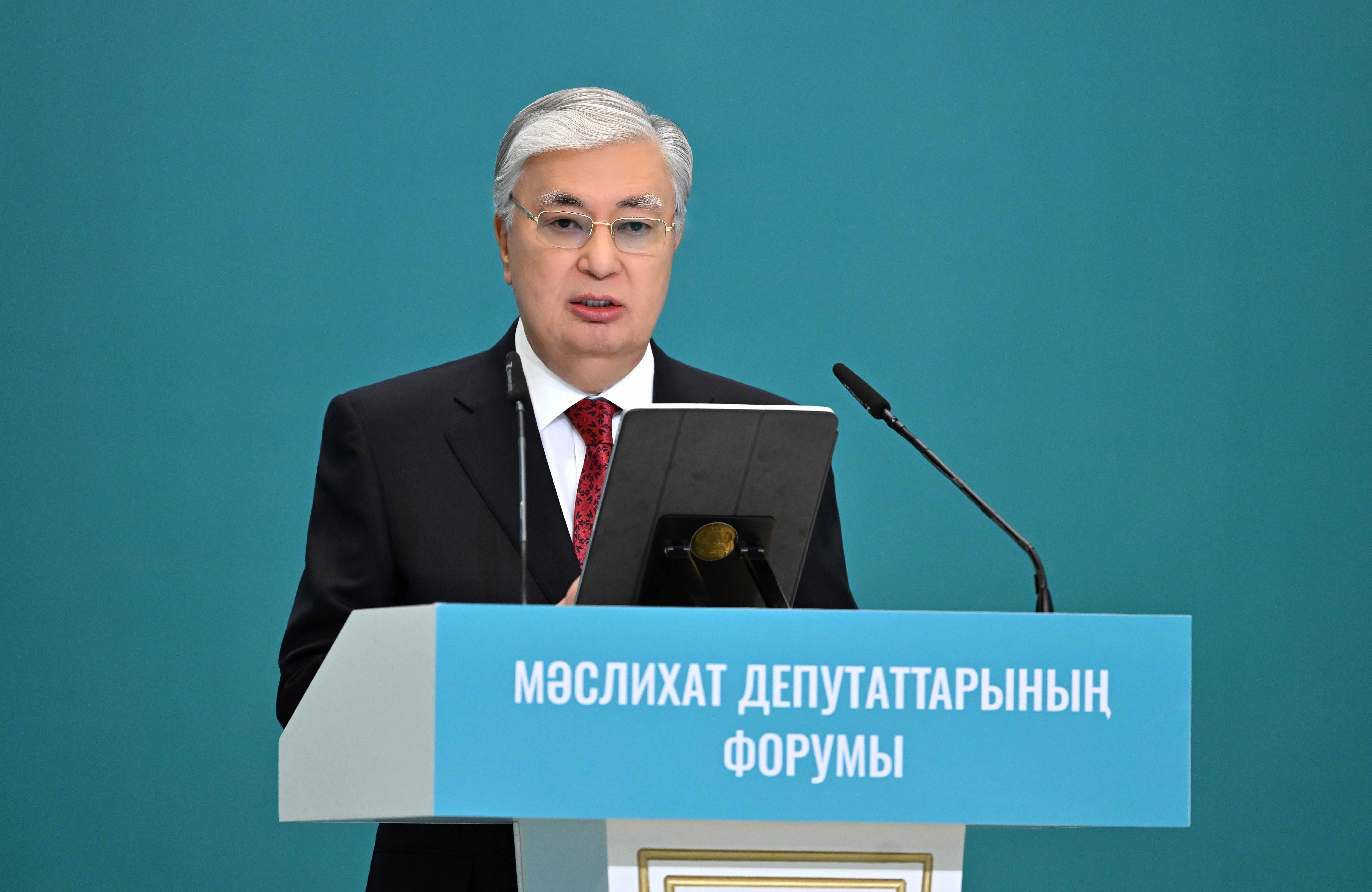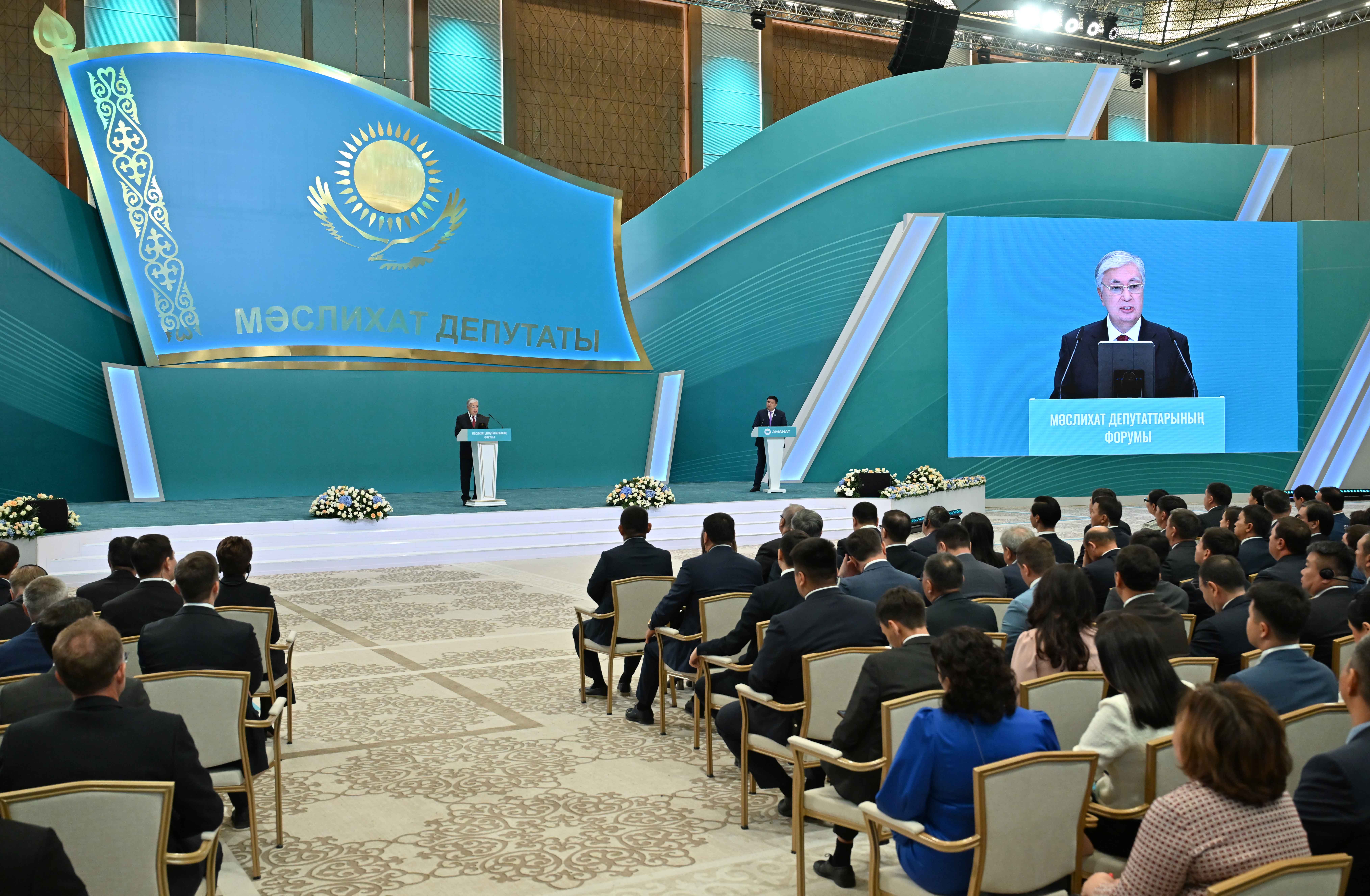ASTANA — Kazakh President Kassym-Jomart Tokayev emphasized the importance of maslikhats (local administrative bodies) in strengthening local governance and urged deputies of maslikhats to take a proactive role in addressing regional challenges at the second Republican Forum on Oct. 3.

Kazakh President Kassym-Jomart Tokayev calls for stronger local government at Second Republican Forum of Deputies on Oct.3. Photo credit: akorda.kz
“Deputies of the maslikhats are the voice of the people,” said Tokayev, stressing that maslikhats are responsible for conveying citizens’ concerns to the executive branch. With over 3,300 deputies nationwide, 70% of whom attended the forum, he called on them to remain closely connected to their constituencies.
Tokayev noted that the transformation of regional political structures has led to increased political competition.
“The recent elections, held under new rules, have refreshed the maslikhats. Representatives from six political parties are now included in the deputy corps. In the past, political parties did not prioritize working with different segments of society. This changed after the introduction of new legal requirements. For example, the share of young people in maslikhats, which was previously less than 2%, has grown due to these legislative changes. Many young deputies are now speaking out on pressing issues concerning Kazakh youth,” said Tokayev.
He added that the number of women in representative government has also increased and that proposals related to women’s rights receive full support from the state.
Empowering deputies and enhancing competence
Tokayev urged maslikhat deputies to raise their professionalism, noting that the effectiveness of these bodies depends on the competence of their members. He proposed collaboration with the Academy of Public Administration to provide training for deputies.

President Tokayev urges deputies to take a proactive role in addressing regional challenges at the Second Republican Forum of Deputies on Oct.3. Photo credit: akorda.kz
“The parties should consider cooperating with the Academy to improve the competencies of their deputies. This work should be organized with attention to regional specifics and the professional and socio-political experience of the people’s deputies,” said Tokayev.
The President also emphasized that deputies should ensure their reports to voters are substantive and not merely formalities.
“Deputies should be able to interact directly with citizens and thoroughly inform the public about their work. It is important to focus on high-quality preparation and meaningful content. Maslikhats can and should serve as a platform for developing a new generation of public politicians,” said Tokayev.
Maslikhats and akimats: expanding socio-economic influence
Tokayev announced the development of new budget and tax codes to address local governments’ economic challenges, emphasizing the need for maslikhats to participate in discussions surrounding these reforms.
“We need substantial proposals to increase the financial independence of local governments. It is important for maslikhat members to take an active role in discussing the draft codes,” Tokayev said. He called on deputies to take budgetary oversight seriously, ensuring that regional funds are allocated effectively.
The role of maslikhats in the country’s broader socio-economic development is expected to grow further. Tokayev highlighted key social areas requiring special attention, including supporting youth, women, entrepreneurs, pensioners and people with special needs. He also emphasized priorities like reducing the population’s debt burden, increasing rural residents’ incomes, reclaiming unused or illegally issued land, and improving environmental and financial literacy.
Tokayev noted that Kazakhstan’s reforms, particularly the introduction of direct elections for rural mayors, mark a significant step in the country’s democratic development. This change enhances electoral culture and strengthens political institutions, bringing in a new generation of leaders.
“I am glad that the parties are joining forces to solve national problems. More than 9,000 families received payments for repairing and restoring flooded houses, and nearly 6,000 received assistance for purchasing housing on the secondary market. In a short time, over 2,500 new houses were built, with 2,620 of the planned 2,680 houses commissioned. All of this was achieved through the collaborative efforts of the state, business and society,” said Tokayev.
“The deputies of the Maslikhat and akims must work in coordination with each other, as they are the two pillars of the state in the regions,” he added.
He also acknowledged the public’s high expectations of akims, calling them natural in a democratic society. “Every mayor should be open to dialogue and capable of having a constructive exchange of views with citizens. When making bold decisions, you should not fear public criticism and avoid responsibility,” said Tokayev.
Nuclear energy referendum: a pivotal moment
In anticipation of the upcoming national referendum on nuclear energy, Tokayev described the decision as a landmark event for Kazakhstan. “Regardless of the voting results, this event will be a milestone,” he said.
“The construction of a nuclear power plant is a long–term project, but it will ensure steady progress for our country for decades to come. It will strengthen our energy sovereignty, give a powerful impetus to the development of various sectors of the economy, science and education, and contribute to the creation of a broad class of engineers and specialists in diverse fields,” said Tokayev.
In his closing remarks, Tokayev urged citizens to participate actively in the democratic process, underscoring that democracy is a continuous effort that shapes the country’s future.
“Peaceful life under a clear sky is our greatest wealth. I firmly believe that our Homeland has a bright future. After all, we all have one goal – to build a Just Kazakhstan and improve the welfare of the people. I am convinced that you will fulfill this task with honor. The Forum of Deputies should become a tradition and be held on an ongoing basis,” Tokayev concluded.
